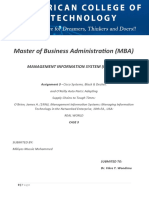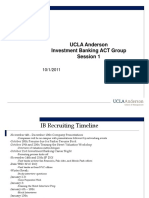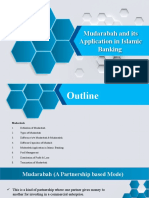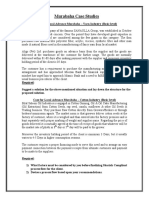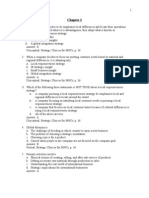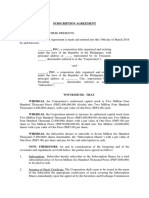Bai' Istijrar (Supply Contract)
Bai' Istijrar (Supply Contract)
Uploaded by
Urfi AchyutaCopyright:
Available Formats
Bai' Istijrar (Supply Contract)
Bai' Istijrar (Supply Contract)
Uploaded by
Urfi AchyutaOriginal Title
Copyright
Available Formats
Share this document
Did you find this document useful?
Is this content inappropriate?
Copyright:
Available Formats
Bai' Istijrar (Supply Contract)
Bai' Istijrar (Supply Contract)
Uploaded by
Urfi AchyutaCopyright:
Available Formats
Bai Istijrar (supply contract) Refers to an agreement between the client and the supplier, whereby the supplier
agrees to supply a particular product on an ongoing basis, for example monthly, at an agreed price and on the basis of an agreed mode of payment. Istijrar means purchasing goods time to time in different quantities. In Islamic jurisprudence Istijrar is an agreement where a buyer purchases something from time to time; each time there is no offer or acceptance or bargain. There is one master agreement where all terms and conditions are finalized. There are two types of Istijrar: Whereby the price is determined after all transactions of purchase are complete. Whereby the price is determined in advance but the purchase is executed from time to time. The first kind is relevant with the Islamic mode of financing. This kind is permissible with certain conditions. 1. In the case where the seller discloses the price of goods at the time of each transaction; the sale becomes valid only when the buyer possess the goods. The amount is paid after all transactions have been completed. 2. If the seller does not disclose each and every time to the buyer the price of the subject matter, but the contractors know that it is being sold on market value and the market value is specified and determined in such a manner that it does not vary and it does not lead to differences of the contractors. 3. If at the time of possession, the price of subject matter was unknown or contractors agree that whatever the price shall be, the sale will be executed. However, if there is significant difference in the market price and the agreed price, it may cause conflict. In such a case, at the time of possession, the sale will not be valid. However, at the time of settlement of the payment, the sale will be valid. As regards the islamic mode of financing, only (a) is relevant. Istijrar can be adopted as a viable mechanism, in the case of suppliers of the borrowers. In the latter case, the bank enters into a murabaha agreement (agreement to purchase) with the suppliers (mainly trading companies), that it will purchase the assets from them at a market price or at a pre-determined discount from the market price. whenever the costumers demand, the bank can purchase that particular asset from the suppliers on the basis of istijrar, and sell it onwards to
the customer, on the basic of murabaha. The validity will relate to the time of possession. Therefore the ownership of the buyer in the subject matter will be proved from the time of possession. After the payment of price the buyer's usage of the subject matter will be valid from the time of the possession. As far as the use of Istijrar in Islamic banks is concerned, at present they are involved in four kinds of activities, namely Murabahah, Ijarah, Mudarabah and Musharakah. Out of these four, the concept of Istijrar can be applied to only the first three cases, due to the reason that Istijrar cannot be applied to borrowers of the bank. However, the same concept can however be applied to suppliers of the borrower. However, Istijrar can work with suppliers of the borrower. In this case, the bank enters into a Murabahah with the suppliers on the basis of Istijrar. The bank enters into an Agreement to Purchase with the suppliers (which are mainly trading companies) that it will purchase assets from them at a market price or at a predetermined discount from the market price. Whenever the bank has a new customer, it can purchase the assets from the suppliers on the basis of Istijrar and sell it onwards to the customer on the basis of Murabahah. It might very well be probable that the bank might enter into a pseudo-Istijrar agreement with the suppliers rather than a true one. This is the case when the bank enters into an agreement with the customer that it is going to sell certain assets in a certain quantity to them within a specified time period. The customer may then purchase the assets from the banks in tranches rather than at once and complete the whole purchase within the specified time period in order to complete the agreement. The above type of Istijrar is referred to as Istijrar with Pre-agreed Sale due to the reason that the customer purchases a given amount of assets from the bank over a period of time but the price of the assets purchased is always known before the sale. Given the above, there is no difference of opinion between Shariah scholars as far as accepting this type of transaction as BaiTa'ati is concerned. However, the use of Ta'ati in case of a Murabahah transaction is not acceptable, as it leads indirectly to Riba in case the bank does not take possession of the assets before they are sold to the customer. Hence if Ta'ati is to be used in this case, then the only way to do it is that the bank should purchase the assets some time before selling it to the customer. This would ensure possession that is not just constructive but the bank would have title to the assets before they are sold to the customer.
Given that the above conditions are complied with to their full extent, Istijrar can be used in case of a Murabahah. Applications of Istisnaa, Juala and Istijrar: The course reviews in four days comprehensively the universe of Shariah concepts, which may be applied for construction, manufacturing or project finance as well as their permissible adaptations. The conditions or shurut relevant and permissible in various structures are discussed in detail. A basic review of AAOIFI and IFSB accounting and regulatory issues is integrated into the lesson plan. The course covers market adaptations; strengths & weaknesses; and structuring precepts. The course may be tailored to focus on retail finance; corporate or real estate finance.
ISTIJRAR (RECURRING SALE) Under istijrar, the buyer purchases different quantities of a given commodity from a single seller over a period of time. In other words, the seller delivers the total quantity of commodity purchased in installments. There is some divergence of views regarding timing of fixation and payment of price. Since istijrar involves repeat purchases from a single seller, some scholars see a room for flexibility in the matter of fixation and payment of price. According to this view, the payment of price may be deferred to a future date and may indeed be based on a normal price or average price prevailing in the market.
Financing sale of goods: using the deferred delivery contracts; using forward agreement contracts. This lecture focuses on other financing methods that are less well-known and under-utilised debt-based instruments. These include the salam; istisna; istijrar and qard. The deferred delivery sale (salam) facility dates back many centuries as a mechanism used to help farmers in need of working capital during crop growing seasons and during crop failures. One such contract known as salam is essentially a forward agreement whereby delivery of the commodity occurs at a certain future date for payment made upfront. The very nature of this facility implies price risk for both farmers/traders and institutions. As such we focus on how price and counterparty risk is mitigated through parallel salam contracts (for example financing goods destined for export).
Istisna is a contract to manufacture. This facility is used extensively in manufacturing, building and infrastructure projects where specific and identifiable goods are financed through tripartite agreements between banks, contractors and manufacturers. Another contract is the istijrar finance facility in which a buyer purchases commodities, with delivery spread over an extended period. Although not related to sale of goods, the qard financing facility assumes the form of benevolent loans. Strictly, this debt instrument falls outside the scope of banking proper, but is dealt with here as it is often used to provide temporary relief to debt stressed debtors.
Istijrar Istijrar is an agreement where a buyer purchases something from time to time; each time there is no offer or acceptance or bargain. There is one master agreement where all terms and conditions are finalized. Bay Bima Yanqati Bihi Si`r Considered as a form of Istijrar sale Definition: An agreement where a buyer purchases goods from time to time (e.g daily, weekly or monthly); with no offer or acceptance or bargain in eachpurchases. There is one master agreement where all terms and conditions are finalized whereby the price is determined after all transactions of purchase are completed. The acceptability of Bay' bi Sir' a Suq has direct impact on Istijrar (please click for earlier post), of course, since in Istijrar, individual or Sub-Murabahas refer to prices only fixed at the time of execution of that Sub-Murabaha. No offer and acceptance or needed, and price is set only by reference to an underlying market. It probably does not help with anything illiquid, say Tier 3 assets, priced by model. It appears that this price-referencing mechanism applies only to those fungibles for which there is a price.
Transforming risk (reducing it through aggregation and enabling it to be carried by those more willing to bear it). it is the case that risk transfer and mitigation can also be provided through Islamic financial intermediaries, but in practice Islamic finance has been slow to meet modern requirements here. That is not to deny that there has been innovation. For example, in Pakistan a contract known as istijrar has been introduced as a variant on murabaha. Whereas the settlement price in a mubaraha can be thought of as p* = (1 + r) p0 , the istijrar sets upper and lower price
bounds pU and pL and may be settled at either p* or p**=
provided pL < p** < pU .
Each party has the option to lock in either p* or p** at any point. The istijrar thus introduces a bounded degree of price risk-sharing (cf. Bacha, 1999).
Instruments of Financing in Islamic Microfinance Mudaraba/Musharaka Suitable for : Fixed assets, working capital (Declining form suitable for housing and equipment finance) Cost of capital : Very high Risk to borrower : Low Risk to Institution : Very high Remarks : Costs of loan administration and monitoring are high given the complexity of the repayment schedule and lack of proper accounting; Perceived to be ideal but not popular in practice. Ijara Suitable for : Fixed assets Cost of capital : moderate Risk to borrower : high Risk to Institution : moderate Remarks : Costs of loan administration and monitoring are low given simple repayment schedule allowing for flexibility and customization based on client preferences; Popular among Islamic MFIs and potential for easy adaptation by conventional MFIs. Murabahah Suitable for : Fixed assets and working capital Cost of capital : moderate Risk to borrower : high Risk to Institution : moderate Remarks : Costs of loan administration and monitoring are low given simple repayment schedule; multiplicity of transactions in working capital financing can push up costs; Highly popular in practice notwithstanding popular perception of it being a close
substitute of riba-based lending. Qard Suitable for : all purpose Cost of capital : very low Risk to borrower : very low Risk to Institution : moderate Remarks : Charity-based usually combined with voluntarism; low overheads; Popular because perceived to be the purest form of financing. Salam Istisna Istijrar Suitable for : Working capital Cost of capital : Moderate Risk to borrower : Moderate Risk to Institution : Moderate Remarks : Ideal for micro repetitive transactions; Complexity not easily understood by parties; hence not a popular mechanism Suitable for : Fixed assets Cost of capital : High Risk to borrower : High Risk to Institution : High Remarks : Back-to-back nature creates risk of lack of double coincidence; Untried Suitable for : Working capital Cost of capital : High Risk to borrower : High Risk to Institution : High Remarks : Back-to-back nature creates risk of lack of double coincidence; Untried
Options in Islamic Finance Recall our earlier argument that to be acceptable an instrument/investment must be free of gharar and not have zero risk in order to provide some positive return.
The Istijrar Contract is a recently introduced Islamic financing instrument. The contract has embedded options that could be triggered if an underlying assets price exceeds certain bounds. The contract is complex in that it constitutes a combination of options, average prices and Murabaha or cost plus financing. The Istijrar involves two parties, a buyer which could be a company seeking financing to purchase the underlying asset and a financial institution. A typical Istijrar transaction could be as follows; a company seeking short term working capital to finance the purchase of a commodity like a needed raw material approaches a bank. The
bank purchases the commodity at the current price (Po ), and resells it to the company for payment to be made at a mutually agreed upon date in the future for example in 3 months. The price at which settlement occurs on maturity is contingent on the underlying assets price movement from t0 to t90. Where t0 is the day the contract was initiated and t90 is the 90th day which would be the maturity day. Unlike a Murabaha contract where the settlement price would simply be a predetermined price; P* where P* = Po (1+r), with r being the banks required return/earning, the price at which the Istijrar is settled on maturity date could either be P* or an average price ( ) of the commodity between the period t0 an t90. Overview of Istijrar As to which of the two prices will be used for settlement will depend on how prices have behaved and which party chooses to fix the settlement price. The embedded option is the right to choose to fix the price at which settlement will occur at anytime before contract maturity. At the initiation of the contract; to, both parties agree on the following two items (i) in the predetermined Murabaha price; P* and (ii) an upper and lower bound around the Po. (banks purchase price at to). The istijrar contract is a recently introduced Islamic financing instrument. (17) Introduced in Pakistan, the contract has embedded options that could be triggered if the underlying asset's price exceeds certain bounds. The contract is complex in that it constituted a combination of options, average prices and Muharabah or cost plus financing. The Istijrar involves two parties, buyer which could be a company seeking financing to purchase the underlying asset and a financial institution. A typical istijrar transaction could be as follows: a company seeking short term
working capital to finance the purchase of a commodity like a needed raw material approaches a bank. The bank purchases the commodity at a current price (P0), and resells it to the company for payment to be made at a mutually agreed upon date in the future for example in 3 months. The price at which settlement occurs on maturity is contingent on the underlying assets' price movement from t0 to t90' where t0 is the day the contract was initiated and t90 is the 90th day which would be the maturity day. Unlike a Murabaha contract where the settlement price would simply be a predetermined price; P* where P* P0 (I +r), with 'r' being the bank's required return learning, the price at which the istijrar is settled on maturity date could either be P* or an average price (P) of the commodity between the period t0 to t90. As to which of the two prices will be used for settlement will depend on how prices have behaved and which party chooses to 'fix' the settlement price. The embedded option is the right to chooses to fix the price at which settlement will Occur at anytime before contract maturity. At the initiation of the contract; t0 both parties agree on the following two items (i) in the predetermined Murabahah price; P* and (ii) an upper and lower bound around the P0. (bank's purchase price at t0). For better elucidation, the different prices are shown below in a continuum as one goes to the right. Prices increase as one goes to the right. where Po = The price that bank pays to purchase underlying commodity. P* = Murabaha price; P* = Po (1+r). PLB = The lower bound price PUB = The Upper bound price The settlement price (Ps) at t90 would be; (i) Ps = ; if the underlying asset price remained within or (ii) Ps = P*; if the underlying asset exceeds the bounds to exercise its The basic idea the bounds. and one of the parties chooses settle at maturity.
option and use P* as the price at which to
behind such a contract is to spread
out the benefits of favourable price
movement to both parties. i.e. Not a zero sum game. Such a contract fulfills the need to avoid a fixed return on a riskless asset which would be considered riba and also avoids gharar in that both parties know up front, P* and the range of other possible prices. (by definition between the upper and lower bounds). The Istijrar from an Options Viewpoint Given our description of the Istijrar Contract, the contract comes across as something that is the
result of modern day financial engineering. Many of the products of financial engineering tend to have the complexities, bounds, trigger points etc. similar to that of the Istijrar. Payoff to Istijrar For either party to exercise its option and thereby the settlement price at P*, the spot price during the term of the contract must have exceeded the bounds at any time. As to which party would exercise would of course depend on the direction of the spot price movement. For example, if the spot price at anytime breaks through the upper bound the buyer would get worried. But whether he will exercise or not would depend on his expectations of the spot price over the remaining period of the contract. If he believes that the price is likely to keep increasing thereby causing p at which settlement will occur to be greater than P*, it will be in his interest to 'exercise' by fixing the settlement price now at P*. Essentially, he would notify the bank that he is exercising his option and that the settlement would be P*. Should spot prices be falling such that it breaks the lower bound, the seller. in this case the bank would have the option to fix the settlement price at P*.
The settlement price is determined as follow: Where PS = Settlement price at maturity P = Average price P0 to P90 Pt = Spot price of underlying commodity of day t P* = The predetermined, cost -plus or Mudarabah price Analyzing the istijrar contract entirely from an options viewpoint is complicated since it has two different exercise styles (18) rolled in one. Such an instrument would be highly unusual in conventional finance. Still for our prupose here, the embedded options in the Istijrar can simply be thought of as follows. The fact that buyer get to fix the buying price at P* when the price goes higher implies that he has a call option at an exercise price of P* while the bank a put option at the same exercise price.(19) What the istijrar contract attempts to do is to allow for the impact for price changes but to cap the benefits that accrue, as a result. By definition, since changes are
allowed only within a band, the advantage to one party and the disadvantage to the other is capped. The maximum potential gain or loss is limited. Such a contract fulfills the need to avoid a fixed return on risk less asset which would be considered riba and also avoids gharar in that both parties know up front, p* and the range of other possible prices. (by definition between the upper and lower bounds).
An alternative financing mechanism for repeated purchases from a single supplier in the Islamic framework is known as bai-istijrar. The difference between bai-istijrar and bai-salam relates to whether purchases are made from a single and regular seller or not. In the former case, it is considered as bai or bai-ajil where payment of price (thaman) can be deferred. In the latter case, price (thaman) must be paid by the buyer at the time of contracting. With bai-istijrar, however, the Islamic bank is exposed to price risk, since the contractual price (thaman) is set at the time of entering into the contract or beginning of the financing period. If market price of the commodity to be supplied increases subsequently, then the Islamic bank would clearly be at a disadvantage. While its cash inflows due to sales to the client-company would remain fixed, the outflows in the form of payments to the original supplier would increase. The client company in this case bears no price risk, its outflows being fixed for the entire financing period. However, it may still be at a disadvantage if prices decline subsequently during the financing period, as its outflows would have been smaller under murabaha. What is clear, is that in extremely volatile markets, entrepreneurial activity would be badly affected in the absence of any mechanism for the parties to manage their risk. The admissibility of options in case of bai-istijrar follows from its being different from bai-salam as discussed above. We may now consider the case of istijrar with options for either or both parties. Since the client-bank would take possession of the raw materials and perhaps put the same to use in stages, it would be required to pay the value of the raw materials in case the contract is rescinded eventually. In case the contract is confirmed later, then the settlement price would be same as the contractual price (thaman). Since the contract would be rescinded if either of them rescinds even if the other party confirms the same, it is expected that the parties would be able to protect themselves against extreme adverse price movements. For example, if the seller holds the option, then it would not rescind the contract if it expects the contractual price to
be higher than value which would perhaps closely approximate the average of daily market prices (assuming that the client-company goes for daily purchases and possession of the raw materials from the Islamic bank). One can also see a possible scenario where the stipulation of options in the istijrar contract is designed to take care of only extreme movements, that is, the options get activated only when the market price pierces a bound. The banks option would get activated if price pierces an upper bound and the clients option would get activated if the price pierces a lower bound. The contract would thus be a case of bai with options for both the buyer and seller which are activated if the market price pierces an upper or lower bound respectively, during the financing period. The option provides a right to a party to fix the sale price at the average of the market prices prevailing during the financing period. Note that average of market price reflects the normal price of the commodity. If the options do not get activated or are not exercised, then the price is settled at the predetermined contractual price. Both the client-firm and the bank agree on a public undisputed source of price information and also a sampling interval for observing prices. The average price is calculated from these observations. Istijrar with khiyar alshart for both parties, as described above, becomes a complex instrument which has some similarities with certain traditional financial engineering products, such as, the average price (Asian) option, and barrier options. A very similar financing arranging has already been in use by the Muslim Commercial Bank, Pakistan.
A valid sale has 4 big elements: 1. Contract or transaction (Aqd) 1.1 Offer & acceptance (Ijab-o-Qobool): The term Offer means that one person proposes to either sell his commodity to another person or buy from him and Acceptance means that the person who has been offered gives his approval of the proposal. Offer and acceptance are always done in past tense eg. I have sold or I have purchased etc. There are two ways of doing it: 1.1.1 Oral (Quali): By saying. 1.1.2 Implied (Isharaa): By indicating. This is of two types: (a) Credit Sale (Istijrar): Eg. settlement of the bill at the end of the month.
(b) Hand-to-Hand Sale (Taati): Exchange of money with goods without uttering Ijab-o-Qobool for procedure adopted in contemporary stores. 1.2 Buyer & seller (Mutaaquadeen): Both must be : 1.2.1 Sane : Should be mentally sound at the time of contract. 1.2.2 Mature: Should be adult, however, if minor, must understand the nature of transaction. 1.3 Conditions of contract (Sharaet-e-Aqd): 1.3.1 Sale must be non-contingent The delivery of the sold commodity to the buyer must be certain and should not depend on a contingency or chance. Eg. A sells his car stolen by some anonymous person to B who purchases it in the hope that he will manage to recover it. The sale is void. (a) Unconditional contract: The sale must be unconditional for eg. A buys a car from B with a condition that B will employ his son in his firm. The sale is conditional and hence invalid. (b) Under reasonable conditions: The conditions which do not go against the contract for eg.A tells B to deliver the goods within a month, the sale is valid. (c) Under unreasonable condition but in market practice: If a sale is under unreasonable condition but is in market practice, the sale is valid. For eg. A buys a refrigerator from B with a condition that B undertakes its free service for 2 years. The condition being recognized as a part of the transaction, is valid and the sale is lawful 1.3.2 Sale must be immediate The sale must be instant and absolute. Thus a sale attributed to a future date or a sale contingent on a future event is void. If the parties wish to effect a valid sale, they will have to effect it afresh when the future date comes or the contingency actually occurs. Eg. A says to B on the first of January: I sell my car to you on the first of February. The sale is void, because it is attributed to a future date. Similarly, if A says to B: If x party wins the elections, my car stands sold to you, the sale is void because it is contingent on a future event.
You might also like
- Technical Analysis of The Financial Markets A Comprehensive Guide To Trading Methods and ApplicationsDocument2 pagesTechnical Analysis of The Financial Markets A Comprehensive Guide To Trading Methods and ApplicationsRupali KambleNo ratings yet
- Current Issues in Istisna & Tijarah (Final)Document12 pagesCurrent Issues in Istisna & Tijarah (Final)Hasan Irfan Siddiqui100% (1)
- AAOIFI Standards For Istisna'ADocument19 pagesAAOIFI Standards For Istisna'AAshraf FarhadNo ratings yet
- Assignment 3 Cisco Systems, Black & DeckerDocument6 pagesAssignment 3 Cisco Systems, Black & Deckermickey mussieNo ratings yet
- MCQ For Chapter 7: Takaful (Islamic Insurance)Document4 pagesMCQ For Chapter 7: Takaful (Islamic Insurance)alaaNo ratings yet
- Case Study-Istisna NewDocument2 pagesCase Study-Istisna Newmali27a767100% (1)
- Ijarah and Mudharabah ExerciseDocument3 pagesIjarah and Mudharabah ExerciseAhmadNajmi100% (1)
- Different Between Islamic Letter of Credit and Conventional Letter of CreditDocument4 pagesDifferent Between Islamic Letter of Credit and Conventional Letter of Creditfatinchegu78% (9)
- Murabaha Case StudiesDocument2 pagesMurabaha Case StudiesOwais Ahmed86% (7)
- Contracts and Deals in Islamic Finance: A User�s Guide to Cash Flows, Balance Sheets, and Capital StructuresFrom EverandContracts and Deals in Islamic Finance: A User�s Guide to Cash Flows, Balance Sheets, and Capital StructuresNo ratings yet
- The Islamic Banking and Finance Workbook: Step-by-Step Exercises to help you Master the Fundamentals of Islamic Banking and FinanceFrom EverandThe Islamic Banking and Finance Workbook: Step-by-Step Exercises to help you Master the Fundamentals of Islamic Banking and FinanceNo ratings yet
- YAMAHA - Kelompok 1 - Dewi - Hasrul - Indra - Nagata - ZulfikarDocument2 pagesYAMAHA - Kelompok 1 - Dewi - Hasrul - Indra - Nagata - ZulfikarZulfikar Nur Ristama0% (1)
- Zara Case Study SolutionDocument4 pagesZara Case Study SolutionNadit BhootNo ratings yet
- Investment Banking Preparation Week 1Document12 pagesInvestment Banking Preparation Week 1daniel18ctNo ratings yet
- Lecture Murahaba Bba8Document35 pagesLecture Murahaba Bba8UmairSadiq100% (1)
- MurabahaDocument21 pagesMurabahaFiza kamran100% (1)
- Assignment On MurabahahDocument4 pagesAssignment On Murabahahjazi_4u67% (3)
- 2 (A) Case Study-Istisna NewDocument20 pages2 (A) Case Study-Istisna Newafshi1850% (2)
- MudharabahDocument21 pagesMudharabahMahyuddin Khalid100% (2)
- Islamic Finance Project On TawarruqDocument23 pagesIslamic Finance Project On Tawarruqmahakanwal.96100% (1)
- Bai Inah N TawaruqDocument16 pagesBai Inah N TawaruqDayana Syafiqah100% (1)
- Problems and Their Solution in MudarabahDocument43 pagesProblems and Their Solution in Mudarabahatiqa tanveerNo ratings yet
- Case Studies MurabahaDocument4 pagesCase Studies MurabahajmfaleelNo ratings yet
- Assignment WakalahDocument21 pagesAssignment WakalahZulaikha Meseri40% (5)
- Bai Al UrbunDocument8 pagesBai Al UrbunSiti Hajar Ghazali100% (2)
- Murabaha - Concept & AAOIFIDocument21 pagesMurabaha - Concept & AAOIFIHasan Irfan SiddiquiNo ratings yet
- Unit 7AccountingforMurabaha&AmpDocument27 pagesUnit 7AccountingforMurabaha&AmpSon Go Han0% (1)
- An Analysis of The Courts' Decisions On Islamic Finance DisputesDocument23 pagesAn Analysis of The Courts' Decisions On Islamic Finance DisputesMahyuddin KhalidNo ratings yet
- This Study Resource Was: Murabahah QuizDocument4 pagesThis Study Resource Was: Murabahah QuizMuhammad Abdullah100% (1)
- The Implementation of Sukuk Ijarah in MalaysiaDocument67 pagesThe Implementation of Sukuk Ijarah in Malaysiaetty100% (6)
- Bay' Al-SalamDocument22 pagesBay' Al-SalamMahyuddin Khalid100% (2)
- Bay' Al-TawarruqDocument12 pagesBay' Al-TawarruqMahyuddin Khalid67% (3)
- Difference On Bba and MMDocument1 pageDifference On Bba and MMJelena CientaNo ratings yet
- Topic 4Document53 pagesTopic 4ShaikhaAlnoaimiNo ratings yet
- Islamic Financial System Principles and Operations PDF 901 944Document44 pagesIslamic Financial System Principles and Operations PDF 901 944Asdelina R100% (1)
- Comparative Analysis of Shariah Review and AuditDocument14 pagesComparative Analysis of Shariah Review and AuditNurazalia Zakaria100% (3)
- 14-Salam and IstisnaDocument5 pages14-Salam and Istisna✬ SHANZA MALIK ✬No ratings yet
- Islamic Accounting AssignmentDocument2 pagesIslamic Accounting AssignmentAhmad Saifuddin Che AbdullahNo ratings yet
- Shariah Advisory Council (SAC)Document31 pagesShariah Advisory Council (SAC)Mahyuddin KhalidNo ratings yet
- Islamic Accepted BillDocument14 pagesIslamic Accepted Billsadique_home100% (6)
- Accounting For Istisna and Parallel IstisnaDocument6 pagesAccounting For Istisna and Parallel IstisnaSuazhari IbrahimNo ratings yet
- Ijarah Operating Ijarah Financial IjarahDocument1 pageIjarah Operating Ijarah Financial IjarahSK LashariNo ratings yet
- Al QardhDocument17 pagesAl QardhMahyuddin KhalidNo ratings yet
- Mudarabah and Its Application in Islamic BankingDocument26 pagesMudarabah and Its Application in Islamic Bankingsaif khanNo ratings yet
- Application of Funds - Financing Facilities and The Underlying Shariah ConceptsDocument40 pagesApplication of Funds - Financing Facilities and The Underlying Shariah ConceptsMahyuddin Khalid100% (2)
- 4.3-Salam & IstisnaDocument32 pages4.3-Salam & IstisnaAllauddinaghaNo ratings yet
- Bai As-Salam and Istisna'Document26 pagesBai As-Salam and Istisna'Angela MaymayNo ratings yet
- Accounting For Istishna PDFDocument35 pagesAccounting For Istishna PDFVani IndrawatiNo ratings yet
- Issues On The Permissibility of Tawarruq Contracts Draft 1Document19 pagesIssues On The Permissibility of Tawarruq Contracts Draft 1Abdul Aziz Mohd Nor100% (1)
- Wakalah PDFDocument14 pagesWakalah PDFZulaikha FadhirNo ratings yet
- Al IjarahDocument24 pagesAl IjarahMahyuddin Khalid100% (3)
- Murabaha Case Studies PDFDocument4 pagesMurabaha Case Studies PDFHassham Yousuf100% (1)
- Ujrah Based Credit Card: Innovation in Islamic Banking ProductsDocument2 pagesUjrah Based Credit Card: Innovation in Islamic Banking ProductsJumadi Kadir100% (1)
- The Islamic Capital MarketDocument12 pagesThe Islamic Capital MarketmugheesNo ratings yet
- MurabahahDocument19 pagesMurabahahMahyuddin Khalid100% (2)
- Tawarruq Concepts and ImplementationDocument20 pagesTawarruq Concepts and Implementationproffina786100% (1)
- Al Kharaj Bi Al DamanDocument3 pagesAl Kharaj Bi Al DamanNik Fatin0% (1)
- Ibf Case StudyDocument17 pagesIbf Case StudyAyesha HamidNo ratings yet
- Marketing Strategy For IslamicDocument16 pagesMarketing Strategy For IslamicTamim Arefi100% (1)
- Part 2-Elaboration of The Selected Shari'ah ContractDocument3 pagesPart 2-Elaboration of The Selected Shari'ah ContractPatrick ChauNo ratings yet
- Case Studies in Islamic Banking and FinanceDocument6 pagesCase Studies in Islamic Banking and FinanceȠƛǝǝm KĦáńNo ratings yet
- Standards & Guidelines Issued By: 1) Accounting & Auditing Organization For Islamic Financial Institutions (AAOIFI)Document22 pagesStandards & Guidelines Issued By: 1) Accounting & Auditing Organization For Islamic Financial Institutions (AAOIFI)A. T. M. Anisur Rabbani100% (2)
- Al WakalahDocument12 pagesAl WakalahMahyuddin Khalid100% (3)
- Use of Media in Sales and SellingDocument27 pagesUse of Media in Sales and Sellingpari bhardwajNo ratings yet
- TestBank Chapter 2-TBDocument8 pagesTestBank Chapter 2-TBAbdul GafurNo ratings yet
- Backflush Costing Notes EncryptedDocument2 pagesBackflush Costing Notes EncryptedNicoleNo ratings yet
- BP Second Quarter 2020 Results Presentation Slides and ScriptDocument84 pagesBP Second Quarter 2020 Results Presentation Slides and ScriptAri CavaleraNo ratings yet
- Food Truck - Rough DraftDocument8 pagesFood Truck - Rough Draftapi-700588079No ratings yet
- Greenovator ProfileDocument18 pagesGreenovator Profilemyint myatthuNo ratings yet
- Cambridge-Igcse & O-Level-Eco-WorkbookDocument81 pagesCambridge-Igcse & O-Level-Eco-WorkbookEllie Housen100% (2)
- Final Finance PartDocument20 pagesFinal Finance Partnour86119No ratings yet
- 026725700784772871Document23 pages026725700784772871Osman TerdiNo ratings yet
- Tax Invoice/Bill of Supply/Cash Memo: (Original For Recipient)Document1 pageTax Invoice/Bill of Supply/Cash Memo: (Original For Recipient)gudoNo ratings yet
- L-Y Subscription Agreement-1Document2 pagesL-Y Subscription Agreement-1sdysangcoNo ratings yet
- 101 Lessons For Aspiring Traders PDFDocument15 pages101 Lessons For Aspiring Traders PDFMukul SinghNo ratings yet
- Busi370 Midterm Practice Summer2012Document11 pagesBusi370 Midterm Practice Summer2012NicoleNo ratings yet
- Developing A Business Mindset: Business in Action 8e Bovée/ThillDocument40 pagesDeveloping A Business Mindset: Business in Action 8e Bovée/ThillTehreem AhmedNo ratings yet
- Chapter 7 Market StructuresDocument33 pagesChapter 7 Market StructuresAtikah RawiNo ratings yet
- Guide To Price Action Entry SignalsDocument21 pagesGuide To Price Action Entry Signalsliban100% (1)
- What Are Impressions and Gross Rating Points?: Gross Costs vs. Net CostsDocument4 pagesWhat Are Impressions and Gross Rating Points?: Gross Costs vs. Net CostsElissaNo ratings yet
- Professional Qualifying Examination PQE SyllabusDocument101 pagesProfessional Qualifying Examination PQE Syllabuskarandeep89No ratings yet
- Faq Margin IciciDocument39 pagesFaq Margin IciciamitthemalNo ratings yet
- B2B E-Marketing Strategies of Multinational Corporations: Empirical Evidence From The United States and AustraliaDocument15 pagesB2B E-Marketing Strategies of Multinational Corporations: Empirical Evidence From The United States and AustraliaManeaNo ratings yet
- Segmentation, Targeting, PositioningDocument62 pagesSegmentation, Targeting, PositioningskruenidruenNo ratings yet
- Consumer Behaviour Chap 1&2Document41 pagesConsumer Behaviour Chap 1&2Dr. Arunava MookherjeeNo ratings yet
- Filinvest Land IncDocument39 pagesFilinvest Land Incarishya24No ratings yet
- Importance of Social Media in b2b MarketingDocument3 pagesImportance of Social Media in b2b MarketingGirish RameshNo ratings yet
- 03 Adverse SelectionDocument3 pages03 Adverse SelectionGna OngNo ratings yet



